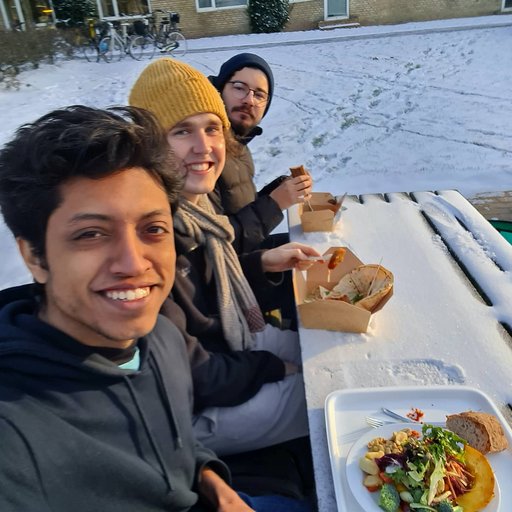An Indian student’s perspective on coming to Denmark to study Computer Science
Why did I choose one of the happiest countries in the world as opposed to the USA or UK to pursue a Master’s in Computer Science? Read on to know more about my experience, which may help you as well.

Hello there, if you are here reading this blog, I am assuming you are considering pursuing a Masters in Computer Science in Denmark.
The short answer to whether you should go for it is yes, 100% yes! But if you are still unsure, I can tell you a few more reasons from my experience at Aarhus University that made studying in this country worth it for me.
In December 2020, when I was back in India and considering where to pursue my Masters, the most obvious choice in front of me was the USA. But listed below are the factors that made Europe, especially Denmark, the more attractive option.
Schengen Visa and travel opportunities
This was definitely on top of the list of pros of studying in Europe. India’s passport ranking is low compared to other countries, which means that I would need a visa to travel to at least 120 other nations. But in Denmark, students get a Schengen visa, which allows you to travel to 26 countries within the Schengen zone, without any restrictions! For travel buffs, this is a huge draw. You get to make the most of your time in Europe by exploring new places and cultures. Moreover, the public transport is great in Europe, which makes travel easy and accessible.
This opportunity to travel and explore new countries is what drew me to the Master’s programme. Thanks to the flexibility of this visa, I was also able to do an exchange semester in Italy!
If you’d like to know more about which countries you can visit with the Schengen visa, visit https://www.schengenvisainfo.com/schengen-visa-countries-list/.
The list doesn’t end there. A few other countries in Europe also become accessible if you have a residence permit in a Schengen country (or a multiple-entry Schengen visa). To know more, visit https://www.schengenvisainfo.com/non-eu-countries-where-you-can-go-with-schengen-visa/.
Tuition fees
This was a big factor. When compared to the USA, UK, Australia or Canada, the tuition fees in Europe are a lot more affordable for students coming from India. At least when I was applying, it was all around Rs 25 lakh for two years. Studying the USA and UK, on the other hand, cost around Rs 60-80 lakh. But the quality of education was comparable everywhere. Of course, the opportunities in the USA are higher, especially for Computer Science, but it also comes at a higher cost.
Moreover, at Aarhus University, students from outside the European Union can stand a chance to be offered a tuition waiver or scholarships. The university offers a limited number of Danish state scholarships for non-EU students, which are financed by the Danish state. What this could cover varies. In some cases, it is a full scholarship, in some a partial tuition waiver, or in some the tuition waiver includes a monthly grant towards living expenses, typically but not always for the duration of your Master’s degree programme.
The best part is that there is no separate application process for this. When you apply to the university, you automatically get considered for the state scholarship as well. You can read more about it here: https://masters.au.dk/scholarships-and-grants
Job opportunities

Denmark is an expensive country and almost everyone has a part-time job here, even Danes and EU students. I also started looking at part-time jobs right after having my bank account set up with Danske Bank. It’s fairly easy to get a job in a non-technical field, like in a restaurant or café. I used Facebook groups like Job I Aarhus and found a job quickly, within a week. I worked as a dishwasher for a month, where I did two or three shifts a week that were within the 20-hour part-time work limit.
I also got a job at the International Centre in the marketing team. Meanwhile, I kept my search for a student role relevant to Computer Science ongoing and eventually, I found something in February 2022 at Roku as a student developer.
I worked there part-time for a whole semester, including full-time in the summer months. It's noteworthy to mention that here in Denmark, students can work 37 hours a week in June, July and August. It's a great way to save some money. For me, working full-time in summer helped me gather savings for my exchange semester in Italy!
My journey with full-time work after graduating was a bit different. I had to apply for a long time since companies had a hiring freeze. But eventually, I found a job in Aalborg, where I am now based. Landing a job in Denmark requires a fair amount of networking and luck. It may take time but it is not impossible.
Which brings me to my next point.
Job-search
I had six months of job seeking time after a two-year Masters. But now students can get three years to find work after a two-year masters. The country is encouraging more and more students to study here. You can read more about the job seeking residence permit here.
Work-life balance

I had heard of Scandinavian countries prioritising a healthy work-life balance and after having worked here for a month now, I can say it is all very true!
For example, back home in India, requesting for a three-week leave meant initiating the conversation with my manager (and manager’s manager!) six months in advance. But here in Denmark, my leave was approved, no questions asked.
There is a healthy work culture where working overtime or on weekends is not encouraged. I am often the last person to leave work and after 5pm, no one is around.
You get to prioritise your personal life, hobbies and commitments here and it’s a different environment than what we are used to in India.
Diversity and study culture
Compared to American countries, students in Denmark get to study with a diverse group of classmates. Since tuition in this country is waived off for EU students, you will definitely have students from different European countries in class. In my class, I had classmates from Spain, Germany, Pakistan, China, and more countries.
It is such an enriching experience to study with an international cohort because the learning goes beyond the classroom. For instance, my study group (the Danish study culture is big on this and it’s great!) had students from Romania and Germany.
Looking back, I now see how much I gained from this programme. Not only am I one degree smarter but also have wonderful friends from different parts of the world. And of course, gratitude for all the joy one of the world’s happiest countries brought into my life!
